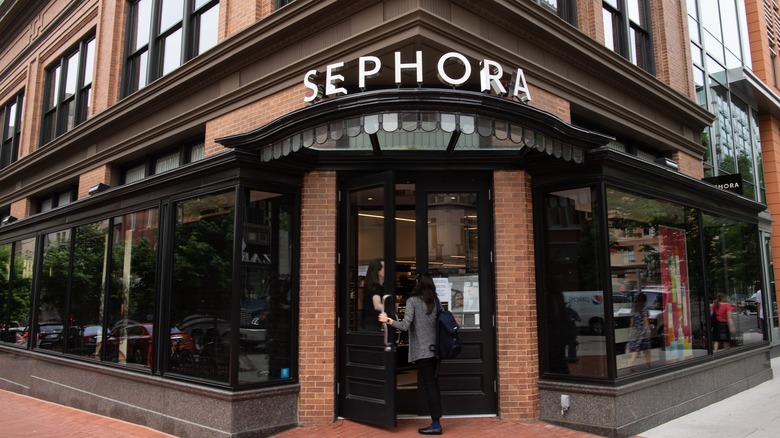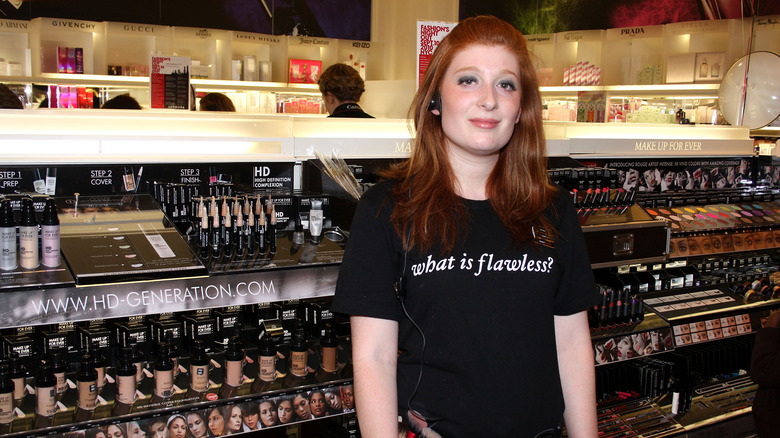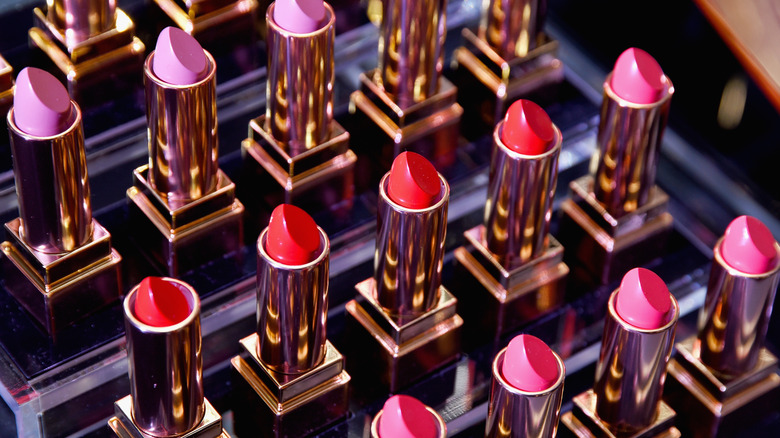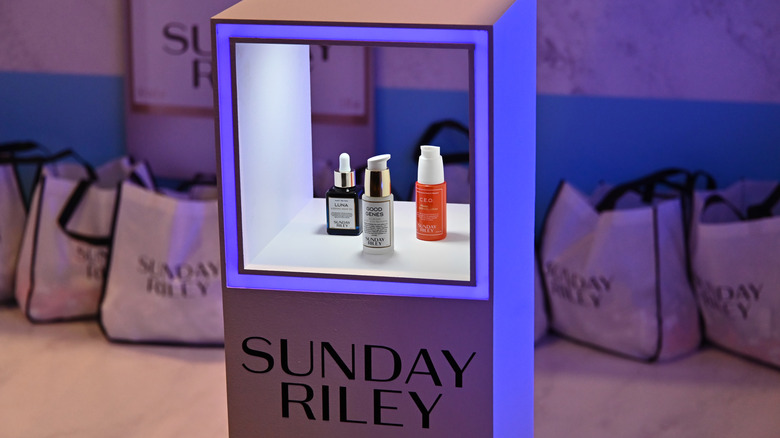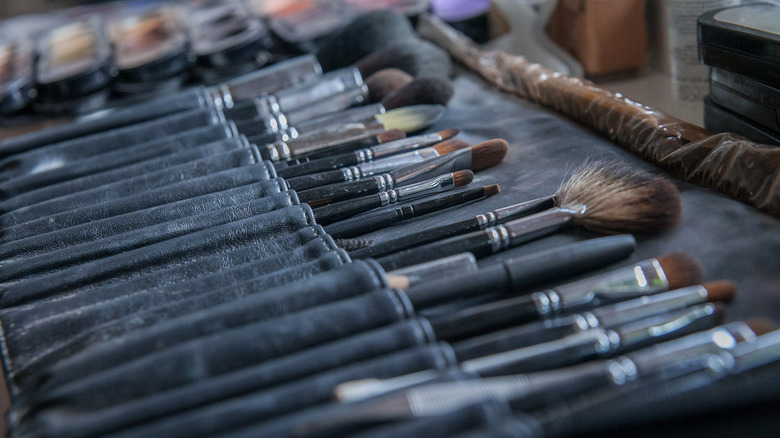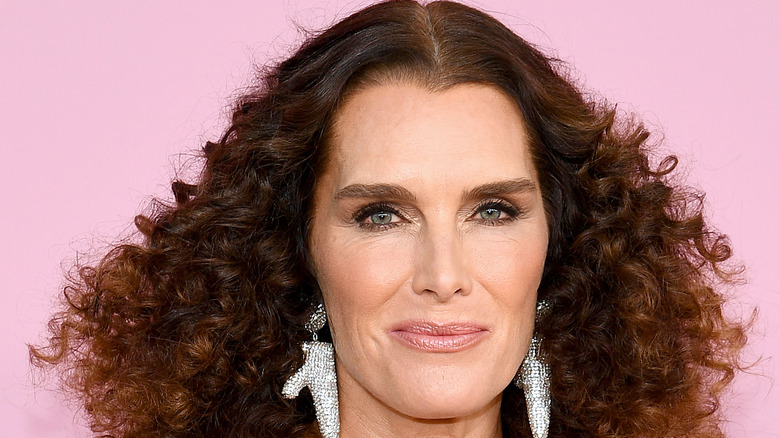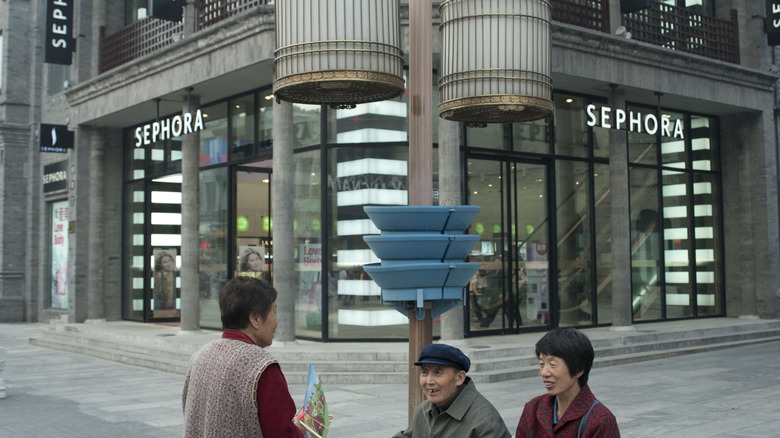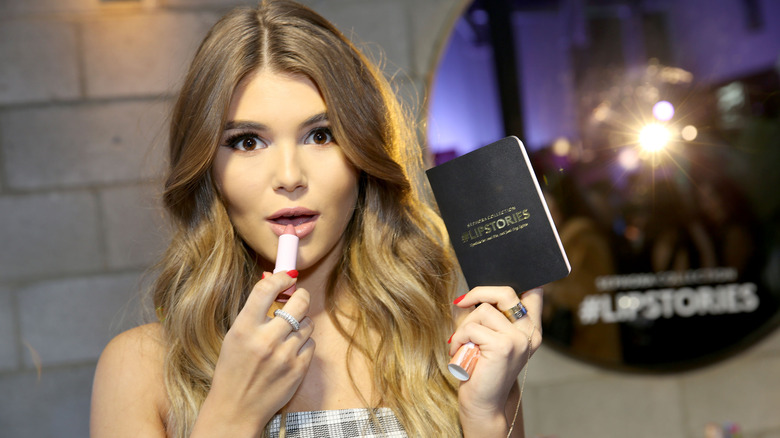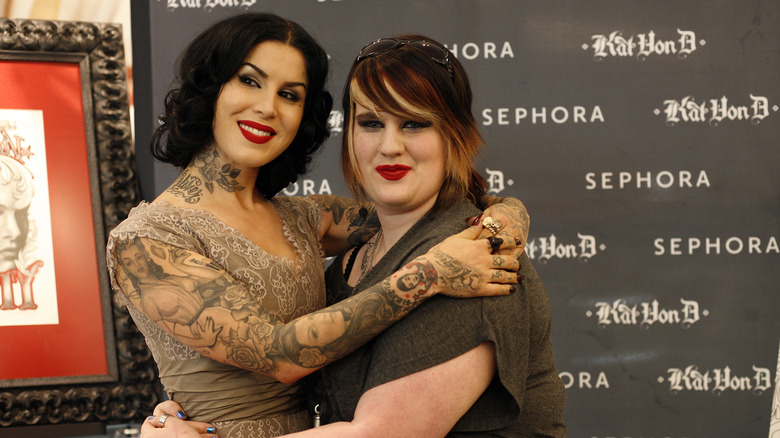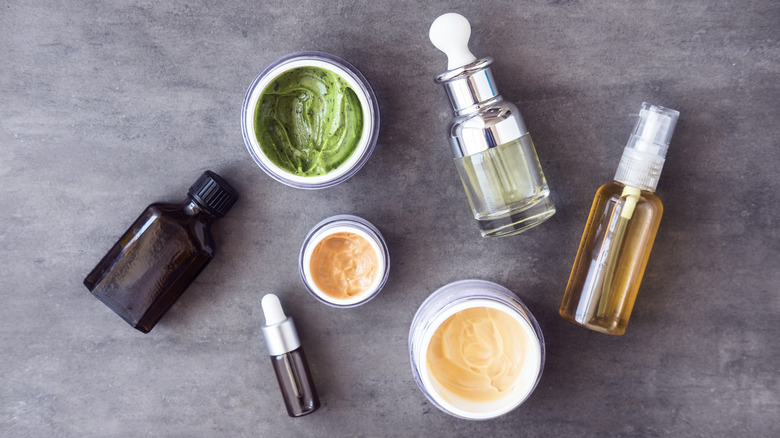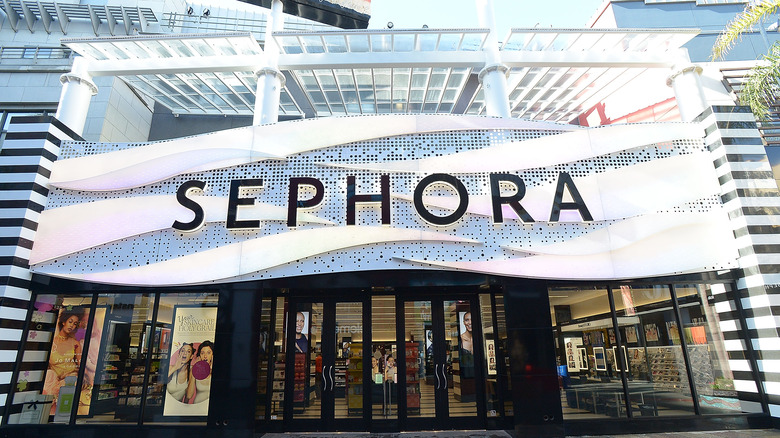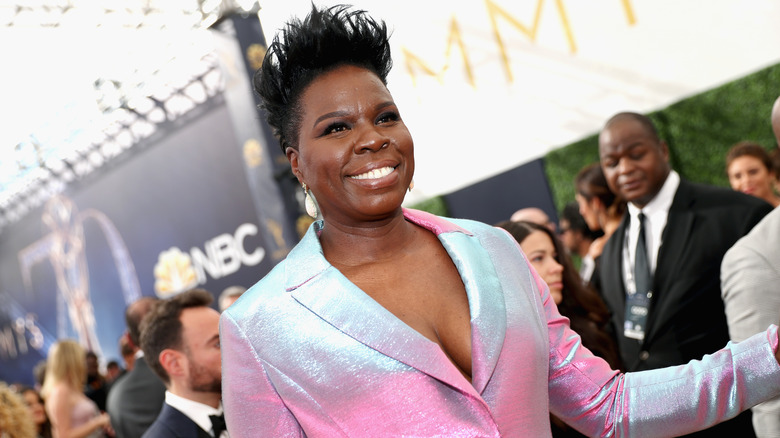The Biggest Scandals To Hit Sephora
For many, Sephora is akin to a grown-up playground. Full of trusty-dusty staple stand-bys and the newest trends in make-up, skin and hair care, as well as fragrances from around the world, the brand is a well known name in the beauty realm.
There are over 2,500 brick and mortar stores in 32 countries that carry hundreds of brands. They also have their own successful line of skincare, makeup, fragrances, and hair care products. Their online shopping experience is considered seamless by many with virtual artist capabilities, the ability to link purchases to in-store history, and easy access to rewards with their tiered Beauty Insider program. Their YouTube channel has over a million followers and boasts hundreds of beauty tips, lessons from experts and interviews with brand partners, celebrities, and makeup and hair artists.
Despite all of its success, Sephora is also famous for scandals. Regularly embroiled in lawsuits over everything from discrimination to STDs and with so many partner brands, there are a lot of juicy details to dig in to regarding all the issues surrounding the famed beauty brand. We'll take a look at some key court cases, some salacious allegations and how the brand handled them, and celebrity partnerships that soured.
Sephora specialists filed a scandalous class action lawsuit
In 2015, Sephora was hit with a class action suit regarding employee issues in California. In Mies v. Sephora, the brand was accused of misclassifying Sephora "specialists" as, "exempt from certain provisions of California labor law."
Sephora employee Eva Mies brought this lawsuit to court on behalf of herself and a slew of other California-based Sephora employees because they all felt they were missing out on overtime pay and guaranteed meal breaks. According to federal law, if an employee spends 50% of their time or more on "exempt" duties (meaning supervisory), then they are not eligible for overtime payment and other guarantees that "non-exempt" status gives. Mies claimed that employees in "specialist" roles were non-exempt employees because of the amount of time they spend on sales-related tasks, and should be classified as such.
A lower court decided against Mies and she appealed. The court of appeals held that the lower court was correct in their assertion that because each "specialist" had a varied account of the percentage of their time that was spent on "exempt" vs. "non-exempt", the court could not classify the category across the board. Bottom line-Sephora came out on top in this case.
Woman claims she contracted herpes from a lipstick tester at Sephora
One of the great things about Sephora is that you can try on pretty much anything in the store to see if it suits you before you buy it. They have a myriad of disposable tools and cleaners to mitigate any health issues that might arise from "testers" of various products.
In a 2018 company statement, Sephora said of its tester set up, "Not only do we have hygiene stations available for client use throughout our stores, our testers are regularly sanitized, replaced and replenished, and our associates are trained on industry hygiene standards to assist our clients."
However, one customer had a bone to pick with the brand regarding her experience with a lipstick tester. Elena Davoyan filed a lawsuit back in 2017 claiming that she tried on a shade of lipstick at a Los Angeles area Sephora and contracted herpes from the sample. She claimed that she never exhibited symptoms before that time. The brand reached a settlement with Ms. Davoyan in spring of 2019, but did not disclose the terms. In a statement regarding the settlement, they denied the allegations that she contracted the disease from their store.
Sunday Riley encouraged fake employee reviews on Sephora's website
User generated reviews are an integral part of the way that consumers come to trust brands. In order for that system to work well, there has to be a code of conduct. For instance, reviews need to be made by actual customers who have experience with the products. In fact, Sephora has list of review guidelines and the Federal Trade Commission has explicit rules regarding disclosure.
Unfortunately, brands don't always adhere to guidelines when it comes to reviews. Take for instance, skincare brand Sunday Riley. An email from management to employees surfaced on Reddit in 2018 asking recipients to not only post glowing reviews of new products on Sephora's site, but to also review other products as well to build a history for a trustworthy profile. They also detail instructions on how to avoid the reviews getting flagged for spam, clearly acknowledging wrongdoing.
Once the information was public, a representative from the company made a comment on the original Reddit post stating that the email was real. In response, Sephora told The Fashion Law that the incident wasn't representative of their review framework and that they spoke with Sunday Riley regarding review guidelines.
Obsessive Compulsive Cosmetics' demise may have been thanks to Sephora
Behemoth retailers can make or break a brand. While bringing visibility to start-ups, they also require considerable investment in product. Many brands have gone out of business leveling up to the big time.
Though we may never know the full story, in 2018, vegan beauty brand, Obsessive Compulsive Cosmetics abruptly closed, shuttering its stores, social media, and website to widespread fan disappointment. OCC was founded by former MAC employee David Klasfield. Colorful and animal-product-free, the brand launched in 2004. In 2012, OCC launched in Sephora.
A rocky start and a few missteps led Sephora to cancel the vendor agreement made with OCC effective April of 2015, stating that they would sell down all in-stock products as well as future products due for outstanding purchase orders. OCC claimed they adhered to verbal changes in the agreement that altered timelines and investments and that ultimately Sephora did not hold up their end of those agreements. Unfortunately, none of it was in writing and it resulted in the court allowing Sephora to dump the remaining OCC products at rock bottom prices. While the brand continued on briefly, there are widespread theories that the ordeal led to its ultimate demise.
Sephora may be collateral damage of Brooke Shields' eyebrow brush lawsuit
Brooke Shields has been famous for decades. Her thick, dark eyebrows are her signature and people all over the world have sought to emulate them since she burst onto the scene at age 12 in the controversial Pretty Baby.
It makes sense that a cosmetics company that manufactures eyebrow accoutrements would attempt to capitalize on her prized asset, but when beauty brand Charlotte Tilbury did just that, the actress took note and filed suit. Marketed as the Brooke S., the $30 pencil claims to "shape, lift, and shade." It is sold alongside other eyebrow products named after celebrities with lust-worthy eyebrows, like the "Naomi", the "Linda", and the "Grace K."
In the 2019 suit, the actress claims that the brand (alongside several retail outlets like Sephora) is hampering potential business because her eyebrows are a source of revenue due to collaborations and endorsements (i.e. a partnership with MAC). It also claims that she already invested money in consideration of her own beauty line, which would be negatively impacted by the existing Tilbury pencil. Not only is she taking the brand to task to get the product off the shelves, but she is also seeking unspecified damages.
Sephora got sued for not making their website accessible
According to the Americans With Disabilities Act, some websites have to be accessible to those with disabilities — just as a physical location does. In terms of physical locations, some of those accommodations include company literature in Braille, ramps for wheelchairs, and access for service animals. When it comes to website regulations, if a business operates for more than 20 weeks a year and has more than 15 full-time employees it is required to provide "reasonable accessibility" to those with disabilities. Though there aren't explicit guidelines to what that means exactly, websites that offer little or no accessibility are vulnerable to lawsuits and marred reputations for non-compliance.
In 2017, Sephora.com customer Lucia Marett was attempting to navigate a purchase on the website. Because Marett is visually disabled she attempted to utilize screen-reading software but Sephora's website was not designed to be compatible with the application at the time. A class action lawsuit was filed in early 2017 whereby she asked that the website be updated in order to be compliant, but it was dismissed by that April. According to Sephora.com's statement on accessibility, they are in line with Web Content Accessibility Guidelines developed by the World Wide Web Consortium.
Sephora didn't fare well after the Sza scandal
R&B superstar, Sza, worked at Sephora before her music career launched like a rocket ship. She told Refinery29 she, "used to work in the skin-care department." Unfortunately, during an April 2019 visit to a Calabasas, California location, she had a terrible experience as a customer of her former employer. In a tweet, Sza detailed the incident (replete with a nickname for the offending employee) saying, "Lmao Sandy Sephora location 614 Calabasas called security to make sure I wasn't stealing. We had a long talk. U have a blessed day Sandy." When Sephora representatives caught wind of what had gone down, they replied that they take her complaint very seriously and said, "You are a part of the Sephora family."
Thousands of supporters spoke out in Sza's defense (including an encouraging word and Fenty Beauty gift card from Rihanna) and some even detailed similar experiences. In June, Sephora launched a campaign called "We Belong to Something Beautiful" in an effort to promote inclusivity. It included a scheduled one-hour, company-wide diversity training. While it happened to almost immediately follow Sza's incident, Sephora told Reuters that was a coincidence and that it had been in the works for quite some time.
Sephora's scandalous discrimination against Asian names
From time to time, Sephora will run exclusive promotions for its VIB and VIB Rouge members. In November of 2014, there was a site-wide 20% off sale for these top customers and apparently it was so popular that the website crashed. As some customers sought help, their interactions with customer service and the subsequent canceling of many reward program accounts left folks with some serious questions regarding potential discrimination.
In the wake of the crash, four Chinese women filed a class action suit against the brand for what they claimed was racial discrimination. They detailed in the complaint that they believed their accounts were deactivated because of their Asian surnames. In a statement released on Facebook and published by Jezebel, Sephora told clients that the site crashed due to the high volume of people attempting to buy in bulk at the discounted prices for resale purposes, and this statement coincided with a number of customers with Asian surnames publicly proclaiming that their accounts were deactivated.
In 2017, Sephora posted a Court Authorized Notice of Settlement detailing that accounts with certain Chinese email address domains that were shut down in 2014 may be eligible for a settlement.
Olivia Jade's Sephora partnership and the college admissions scandal
In 2018, Sephora cut a deal with YouTube star Olivia Jade to partner on a bronzer. She is the daughter of actress Lori Loughlin of Full House fame and fashion mogul Mossimo Giannulli. For a teenager, she had what appeared to be a dream life: a lucrative business, loving parents, and a spot at the University of Southern California alongside her older sister Isabella Rose. It was a natural collaboration after Sephora secured successful influencer posts with her in the past.
Everything came to a screeching halt after scandalous news broke that her parents were accused of employing nefarious tactics and committing fraud in order to secure a spot at USC for their two daughters. The FBI unearthed the scandal in Operation Varsity Blues and allege that Jade's parents paid upwards of $500,000 and faked a photoshoot to pretend their daughters were rowers to gain spots at the school.
Almost as quickly as the news hit, Sephora dropped the partnership deal like a hot potato. In a statement on Twitter, Sephora wrote, "After careful review of recent developments, we have made the decision to end the Sephora Collection partnership with Olivia Jade, effective immediately."
Kat Von D picks some scandalous lipstick names and Sephora suffers the backlash
Tattoo artist and make-up maven Kat Von D has a long-running and successful partnership with Sephora. After appearing on Miami Ink followed by LA Ink on TLC for many years, she launched her Kat Von D Beauty line in 2008, exclusively with Sephora. According to Sephora.com, the brand's "mission is to create performance vegan makeup so everyone can make compassionate choices without sacrificing bold, beautiful color and everlasting wear."
However, the cruelty-free line is certainly not scandal free. In 2012, reports surfaced that the brand released a lipstick color named, "Celebutard". Nearly immediately, Sephora pulled the lipstick from shelves telling CTV News, "It has come to our attention that the name of one shade of lipstick we carry has caused offense to some of our clients and others. We are deeply sorry for that."
In 2015, she was embroiled in another naming scandal over the lipstick shade, "Underage Red". This time, Kat Von D herself took to Facebook saying that the assumed sexualized connotation was not intended but was influenced by underage concert attendance, also stating, "I don't see why anyone should aim any backlash towards such a great company like Sephora."
Sephora was sued over violation of privacy
In an age where our biometric information is considered a precious commodity, one Illinois woman is suing Sephora and Modiface Inc for what she alleges is a violation of her privacy. Sephora boasts of its Virtual Artist App, which allows users to virtually try on different make-up looks and test out colors and products utilizing user images. While it can be a fun way to shop, plaintiff Auste Salkauskaite claims they take more than just pictures.
According to the Cook County Record, in a complaint filed on November 19, 2018 on behalf of herself and "on behalf of similarly situated individuals," she claimed that when she participated in the Virtual Artist Kiosk, personal information (such as a cell phone number) was collected and disseminated in order to sell her Sephora products. The claim states that violates the Illinois Biometric Privacy Act. The complaint also states that there was no written notice that the information would be, "captured, collected, stored and used."
Though not much information is publicly available at the time of publishing, it appears the case has moved from Cook County Circuit Court into the US District Court for the Northern District of Illinois, and is ongoing.
A veteran Sephora brand's eye serum allegedly leads to a permanent burn
Sephora has been carrying men's skin care line Peter Thomas Roth for many years. According to Sephora's Behind the Brand, Roth has a Hungarian heritage with a family background in the spa realm, and utilizes ingredients from around the world in his products. With mostly four-star or more reviews on their site, clearly the partnership is doing something right.
However, one customer claims that both brands knowingly sold him a product that would cause him harm. Rolando Grullon filed a lawsuit after he purchased the Laser Free Eye Serum (notably, no longer available) from a New York area Sephora and had a negative reaction. According to Yahoo.com, the serum caused red bumps which caused him to cease using it, but it still resulted in a burn that would not heal. He claimed that the injury is permanent and he sought damages from both brands claiming, "charges of malice, oppression and fraud against Sephora and Peter Thomas Roth." The suit was seeking compensation in the amount of $500,000.
It appears neither brand has made a statement regarding the incident. It is possible that the case was dropped or that it was settled out of court.
Sephora reportedly reprimanded employees for speaking Spanish
In 2003, the Equal Employment Opportunities Commission filed a lawsuit on behalf of five former Sephora employees claiming that the women were forbidden from speaking Spanish on their lunch breaks or anywhere on the premises. The women worked at the since-closed Rockefeller Center flagship outlet and, According to The New York Times, claimed they were reprimanded for speaking their native language.
According to The Times, not only were they not allowed to speak Spanish, "Their supervisors mimicked their accents and derided their culture, they say, and if they complained about it, they suffered even more." The Times also reported that Sephora issued a statement through a spokeswoman saying, "Sephora does not tolerate discrimination of any kind." The statement continued saying, "Furthermore, we do not have, and never have had, an 'English-only' rule in our workplace.”
According to the University of Michigan Law School case study, it appears that the case was settled in September of 2007 with a consent decree that doesn't include an admission of guilt from Sephora, but does lay out requirements that they not practice discrimination, carry out any retaliation, and that they must hold anti-discrimination trainings. It also requires payment by Sephora in the amount of $565,000.
Leslie Jones calls for a boycott of Sephora
Hilarious Saturday Night Live actress and Twitter star, Leslie Jones elicits gut laughter on the regular, but she had an interaction with Sephora that left no one chuckling. In fact, it left multiple people in tears. On June 4, 2019, one day before Sephora shut down for a scheduled inclusivity training, Jones detailed a story on Twitter about her make-up artist visiting a New York area Sephora with a friend, only to leave in tears after being mistreated. The story claims that both a salesperson and a manager were unkind to her friends, and she called for a boycott saying, "NO MORE SEPHORA" and later on adopted the hashtag #NOMOSEPHORA on Instagram.
Starting to sound like a broken record, a Sephora representative sent a statement to Business Insider saying, "The information shared by Leslie Jones regarding [makeup artist] Lola Okanlawon's experience at Sephora is concerning, and the situation she describes does not reflect our values." In her original Instagram post, Jones questioned why they have to train employees in sensitivity in the first place, pondering why they don't just hire sensitive employees. She went on to say, "What happen to customer service. Do we just not give a f**k anymore!!"
